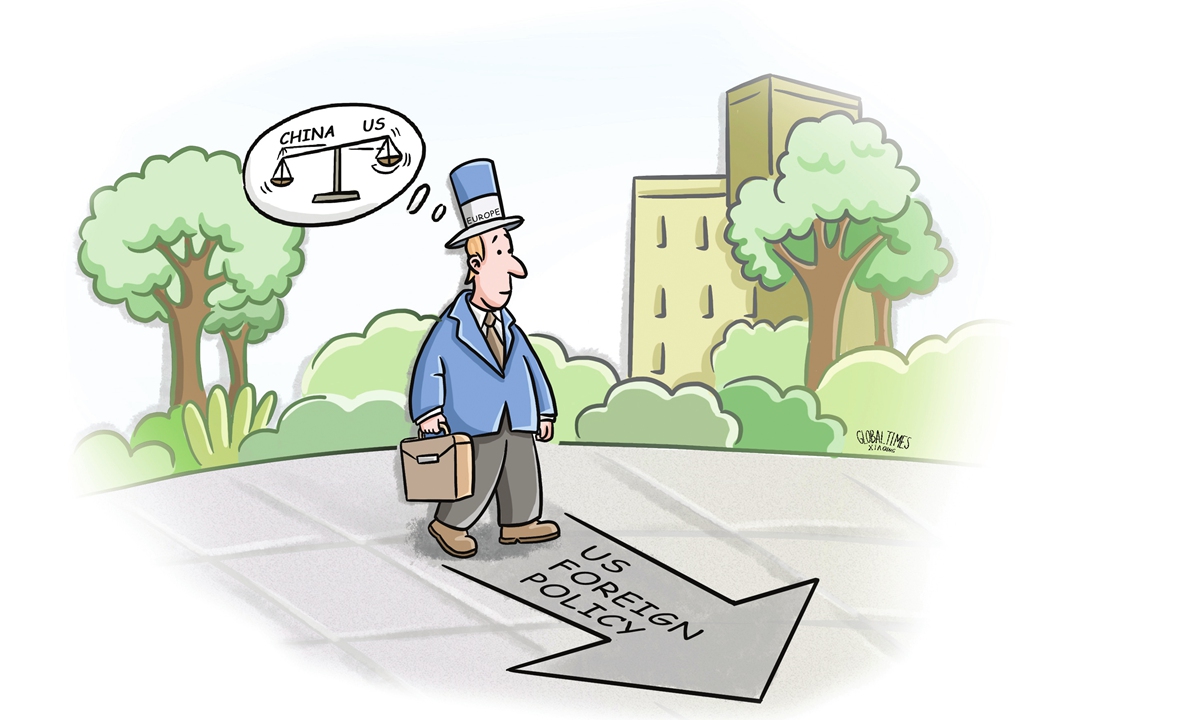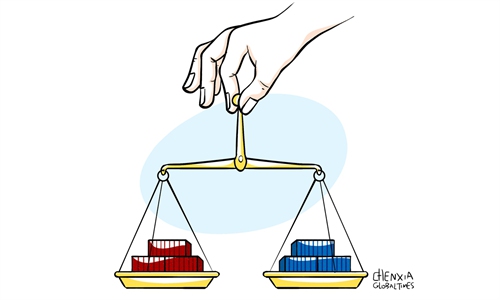
Illustration: Xia Qing/GT
On Thursday, the President of the European Commission, Ursula von der Leyen, delivered a speech on China, focusing on what "getting China right requires." What is the relationship between Ursula von der Leyen's advocates and the EU's pursuit of its China policy in terms of its "surface" and "essence"?In my opinion, although the EU's China policy occasionally experiences some turbulence, it is generally characterized as coherent and stable. On the one hand, taking the US and Europe as the axis of foreign relations is fundamental to the EU's foreign relations. Without question for the EU, the US is still considered its most important ally and reliable partner. Regardless of how close the relationship with third parties may be at any given moment, when viewed over a long period of time, the relationship between the US and the EU is still difficult to replace.
On the other hand, the China-EU relationship is crucial to the EU's external relations. In a globalized world, the close relationship between the US and the EU is not enough to encompass all of the EU's important external relationships. I believe that the China-EU relationship is the most critical external relationship for the EU, apart from the US-Europe relationship. After all, China, the US and Europe are all at the forefront of the world in terms of economic and political influence, and they play a crucial role in areas such as the digital economy and artificial intelligence.
Taking the US-EU relationship as the foundation and the China-EU relationship as the key, these have set out the main principles guiding the EU's foreign policy in recent years. Based on this, decision-makers in the EU have demonstrated three characteristics in the operational aspects of their foreign policy.
First of all, they exhibit at least a superficial "submissiveness" under political pressure from the US. It is not difficult to understand, as "Old Europe" has become highly dependent on the US not only militarily but also politically and technologically since World War II. This is also why, after the US government proposed the US' three-point strategy to China a few years ago, EU decision-makers almost copied them verbatim.
Ursula von der Leyen is a typical example of someone who exhibits strong "submissiveness" to political pressure from the US. However, I do not believe that Ursula von der Leyen truly represents the position of the US. I think that her frequent display of accommodation to US viewpoints is more of a "surface" than her "essence".
Then, EU decision-makers have shown a "fear" of China's technological progress, which is clearly a misunderstanding of the so-called "threat" posed by China's technological advancements. Since the "new economy" era of the world entered the "post-industrial" era, China has demonstrated strong capabilities in many high-tech fields, particularly in the digital economy and artificial intelligence. This has caused deep concerns among some EU decision-makers, including Ursula von der Leyen. This is also why she occasionally promotes her "de-risking strategy" upon three pillars, namely defence of economic interests, dialogue to address differences, and diversification with partners.
Moreover, traditional European and American political systems are prone to the "term effect." This means that some politicians, in order to secure votes, can only cater to the demands of their target voters rather than prioritizing the demands that are reasonable or beneficial to the EU's medium- and long-term development.
It also inevitably leads to the "variability" of some politicians. As the votes change over time, these politicians must quickly change their political positions, both domestically and internationally. This is also why high-ranking EU officials like Ursula von der Leyen flip-flop with their policies.
In conclusion, when facing the EU's "submissiveness", "fear" and "term effect", we need to understand not only the "surface" but also the "essence" of these issues. And we can take practical, effective, persuasive and logical measures to gain a better understanding and recognition from more EU decision-makers of China's peaceful development and the construction of a "community with a shared future for mankind."
The author is director of the French Economic Research Center and researcher of the Institute of Regional and International Studies at the University of International Business and Economics in Beijing. opinion@globaltimes.com.cn

